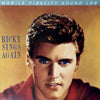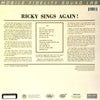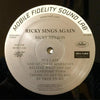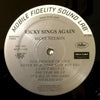







Ricky Nelson – Ricky Sings Again (Stereo & Mono, MOFI Silver Label, Ultra Analog)
ORDER LIMITED TO ONE ITEM PER CUSTOMER
Vocals - Ricky Nelson
Background vocals - The Jordanaires
Bass – James Kirkland
Drums – Richie Frost
Guitar – James Burton
Piano – Gene Garth
Arranged by Jimmy Haskell
Written by Dorsey Burnette (A1, A3), Dorsey Burnette (A2-3, Baker Knight (A4, B2, B4), Rose Marie McCoy (A5), Charlie Singleton (A5), James Kirkland (A6), Nat Stuckey (A6), Al Jones (B1), Bill Jones (B1), Merle Kilgore (B1), Hank Williams (B3), Charles Dawes (B5), Carl Sigman (B5), Johnny Cash (B6)
1LP, standard sleeve
Limited numbered edition
Original analog Master tape : Silver Label (Copy of original Mastertape)
Heavy Press : 180g
Record color : black
Speed : 33 RPM
Size : 12'’
Stereo & Mono
Studio
Record Press : unspecified
Label : MOFI
Original Label : Capitol
Mastered by Krieg Wunderlich
Originally released in January 1959
Reissued in 2012
Tracks:
Side A:
- It's Late
- One Of These Mornings
- Believe What You Say
- Lonesome Town
- Trying To Get To You
- Be True To Me
Side B:
- Old Enough To Love
- Never Be Anyone Else But You
- I Can't Help It
- You Tear Me Up
- It's All In The Game
- Restless Kid
Reviews :
“By the time of his third album, most of which was recorded when he was 18 years old, Ricky Nelson had lots of performing under his belt, and the roadwork showed in his much more confident vocals. Also, as a major recording artist, he was having material written for him instead of having to fill up his LPs with covers of other people's hits. In those songs and in the covers he still did, he hewed to the rockabilly sound developed by Elvis Presley and others in and around Memphis, TN. In particular, he had become a follower of Dorsey Burnette, who co-wrote his 1958 hit "Believe What You Say" with his brother Johnny and took sole writing credit on the album's first two tracks, "It's Late" (soon to be a Top Ten hit) and "One of These Mornings." Such songs were tailored for Nelson, but they were very much in the style of what was currently popular; "It's Late," for example, in sound and subject matter, bore similarities to the Everly Brothers' 1957 hit "Wake Up Little Susie." Thus, even on his own songs, Nelson still sounded like a carbon copy of his betters, and when he tackled a classic like "Trying to Get to You," an Elvis Presley Sun sessions song, or Hank Williams' "I Can't Help It," his inadequacies were accentuated. In a sense, Nelson was a victim of his own success; he was still a promising, developing artist in terms of his abilities and experience, but he was also the second most successful pop singles artist of 1958, right behind Presley, which raised the bar of expectations. Ricky Sings Again found him branching out toward country music and anticipating the rise of teen pop, but it did not live up to his star status.” AllMusic Review by William Ruhlmann
Ultra Analog™ : The GAIN 2 Ultra Analog™ Series stems from the use of the Gain 2 system, mastered at half speed from the original master tapes where possible, capturing and uncovering as before undiscovered sonic information.
Half-speed mastering. In half-speed mastering, the whole process is slowed down to half of the original speed. A typical 33 1/3 rpm record is cut at 16 2/3 rpm. The source material is also slowed down (reducing the pitch in the process) meaning the final record will still sound normal when played back. Slowing the whole process down allows more time, which means the end result sounds better and is more efficient — allowing engineering to minimize the effects of inherent limitations within the vinyl format. The result is a more accurate and more open high-frequency response in the half speed vinyl when compared with a normal speed recording.
Ratings :
AllMusic : 3 / 5 , Discogs : 4,54 / 5




